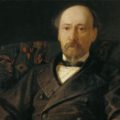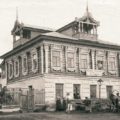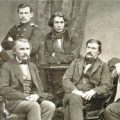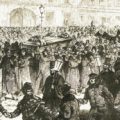- Портрет Н.А.Некрасова. Н.Н.Ге, 1972 год
- Усадьба Грешнево, Ярославская губерния. XIX век
- Редакция журнала «Современник»: И.А.Гончаров, И.С.Тургенев, Л.Н.Толстой, Д.В.Григорович, А.В.Дружинин, А.Н.Островский
- Похороны Н.А.Некрасова. 1877 год
Nikolay Nekrasov is known as the “most peasant” Russian poet. He was among the first to speak up about the tragedy of serfdom and peer into the soul of the Russian peasantry. His works represent an all-embracing world full of love for common people, for his motherland, and for the Russian language and culture.
To him the fate prepared a road of glory and mighty name
Nikolay Nekrasov was born on December 10, 1821 in the village of Nemirovo in Podolia Governorate in present day Ukraine. His father Alexey, a man of fiery temper and despotic character, at that time was stationed there with his regiment. The writer’s childhood years were spent in Yaroslavl Governorate, at his family estate in the village of Greshnevo. He grew up among the local children and at a young age heard old Russian fairy tales and songs from his nanny; he listened keenly to the vibrant, rich, imaginative folk speech.
At the age of eleven, Nikolay and his brother enrolled in Yaroslavl gymnasium, but he showed no particular zeal for studies. During that period, he began writing his first satirical poems. Five years later, Nikolay Nekrasov left gymnasium after falling behind in a number of subjects. Moreover, his father refused to pay for his son’s education. Nikolay lived with his parents for a year, and he started making plans about his future. His father wanted his son to join the regiment and receive a military education. But military career did not appeal to the future poet.
Yes, our life was that of rebel full of unrest and full of loss
At the age of sixteen, Nikolay came to Saint Petersburg full of hopes and became an extern student at the Philology department of the Saint Petersburg University. The northern capital was not kind to the young man. He had no relatives or patrons, and his father stopped helping him after realizing that Nikolay went against his will and was not going to pursue military career. His life was tough. To avoid death from hunger and in great need of money, the future writer finds part-time jobs, gives lessons, writes poems to order. He found acquaintances who tried to help and print his poems, but young authors were paid very little. The poet recalled that “there were such difficult months that every day he went to the Sennaya Square and wrote letters and petitions for peasants for 5 kopecks or a piece of white bread.”
Thanks only a to sound health, persistence and strong will Nekrasov managed to preserve faith in himself, his talent and his destiny. He saved enough money and published his debut collection of poems and ballads Dreams and Sounds (1840). Unfortunately, it got a cold welcome from the audience. Trying to avoid the disgrace, Nekrasov bought back almost all printed copies of the book and burned them. After that failure he decided to quit poetry and began working with prose, writing novels and stories, plays and vaudevilles, alphabet books and fairy tales, trying to earn a living and to make a bit of money.
Ah, those were the happy years
At that difficult period, Nekrasov met Vissarion Belinsky who would later have a strong impact on the writer and take the most active part in the young poet’s life by first introducing him to the literary beau monde. What is more, under the influence of the famous critic, Nekrasov’s views became harmonious and integral.
Nikolay Nekrasov became an active publisher before he turned twenty. He emerged as an excellent organizer and a wise manager, and in 1846 together with a writer Ivan Panayev he acquired a famous magazine Sovremennik that was founded by Alexander Pushkin. The magazine quickly became popular and influential in the society, and the best writers of the time became its contributors. Sovremennik unveiled such great talents as Ivan Turgenev, Ivan Goncharov, Alexander Gertsen, Dmitry Grigorovich and others. Alexander Ostrovsky and Mikhail Saltykov-Shchedrin who were already famous published their works there. Thanks to Nikolay Nekrasov and his magazine, Russian literature knew the names of Fyodor Dostoyevsky and Leo Tolstoy.
I gave my lyre to my people
While working in Sovremennik, Nikolay Nekrasov also published several collections of his own poems. Peasant Children and Korobeyniki immediately brought him wide acclaim, largely because Nekrasov was the first poet to talk to the public about the sufferings of ordinary people, to write about the hardships of peasants and the urban poor. He managed to gain widespread and long-lasting fame as the poet of the crowd and “a singer of people’s sorrows”.
Nekrasov’s works introduced a number of novelties to the Russian literature: he was one of the first to combine satire, lyricism and elegiac motifs, and use colloquialisms to demonstrate the opulence of the Russian language.
The poem Poet and the Citizen was the real gem of these collections. It clearly expressed the idea that poetry is an important social cause, and that a true poet has no moral right to shy away from the struggle for progressive ideals.
My poems!
Witnesses of unavailing tears
In 1862, the government banned Sovremennik. And once again, Nekrasov did not give up: he became in charge of the magazine Otechestvennye Zapiski (Fatherland Notes) to which he had contributed as an editor before. The last ten years of writer’s life are closely associated with this magazine. He published his epic poem Who Lives Well in Russia (1866–1876), poems about Decembrists and their wives Russian Women (1871–1872) and Grandfather (1870), and some satirical works that culminated in the poem Contemporaries (1875).
During the painful years before his death, after being diagnosed with bowel cancer, Nekrasov wrote The Last Songs — a cycle of poems which he dedicated to his wife and last love Zinaida. The writer died on January 8, 1878 and was buried in St. Petersburg at Novodevichy Cemetery. His funeral gathered a huge crowd, and many famous people came to say their farewell. Dostoevsky in his speech name Nekrasov the third greatest Russian poet, right behind Pushkin and Lermontov. The crowd protested and interrupted him with shouts “He is better, better than Pushkin!”
Elena Malinovskaya




